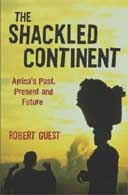
The Shackled Continent: Africa's Past, Present and Future
by Robert Guest
288pp, Macmillan, £20
by Robert Guest
288pp, Macmillan, £20
Here is the authentic voice of the new-style missionary in Africa. Robert Guest is exploring the dark continent with intrepid adventures, carrying not the Bible but the Economist to assure the benighted tribesmen that they can be saved by putting their faith in free-market global capitalism, which will rid them of their local superstitions and bring them a new era of prosperity.
The author is well equipped for his double role. He is a lively and observant reporter who can describe, in a breezy no-nonsense style, the horrors and miseries of Africans in the interior: the grinding poverty, the brigands at road-blocks, the vengeful massacres. At the same time he has been the Economist's African correspondent and is now its Africa editor, and believes in the true faith: that the continent's sufferings are all due to the failure to embrace capitalism.
Visiting Mr Zimba, a small farmer in Malawi who has built himself a tiny mud shack with plastic bags for window-frames, he has no doubts: "I have never seen a more poignant illustration of why the world's poor need capitalism."
He portrays, with humour and some compassion, how nothing really works in most African countries: in case we don't get the message, the book emphasises it with typography which shows the title and headlines in wonky type with lopsided lettters. He describes how Africans are shackled by corrupt officials, predatory rulers and "vampire governments" determined to impose statism and suppress individual enterprise.
But like the missionaries he still has hope for the future. "In the long run, I believe that Africa will prosper. Any country can make the transition from poverty to comfort. We know this because it has been done before, in countries as different as Italy and Japan."
He accepts that the workings of the free market will be harsh and unsentimental, ruthlessly exploiting cheap labour. It is a process, he explains, which "advocates of heartless global capitalism, such as the Economist, have been banging on about since the 1840s". But he is confident that the market system, together with pressure from lobbies, will ensure that companies will behave fairly: "who wants to work for a company that pollutes the planet or drives third-world peasants off the land?"
His view of capitalism is not limited to big corporations: he recognises the crucial importance of the informal economy in Africa and supports the theories of the Peruvian economist Hernando de Soto which say that dwellers in shanty towns need to acquire property rights to give them a foothold on the capitalist system.
In many African countries, where predatory governments enforce state controls, the need for individual free enterprise is clear enough and the author's arguments are persuasive. But in South Africa he is much less convincing, and he does not face up to the past record of the Economist's "heartless global capitalism" and anti-communist crusades which led the magazine to defend apartheid governments and to oppose sanctions - which proved the chief instrument of the peaceful revolution.
Instead, he provides a breathtakingly crude cold-war explanation of the transition: the collapse of the Soviet Union prompted the ANC, the main black liberation movement, to renounce Marxism. This reassured white South Africans that black rule would not mean having their shops and houses confiscated, and so emboldened them, in a referendum, to give blacks the vote.
It is this kind of interpretation which gives capitalism an unnecessarily heartless reputation. For it was the American banks, and the sanctions imposed by the US Congress - hard-pressed by Christian and student lobbies - which began to undermine apartheid long before the collapse of the Soviet Union. And it was the support of western media and churches for the ANC which persuaded them that they had more friends in the west than the east, and helped to reconcile them with capitalist countries.
The author insists on applying the same automatic explanations to contemporary South Africa as elsewhere. "The rise of joblessness has largely been a consequence of the government's efforts to protect workers," he explains, with no mention of the huge effects of cor porate downsizing, immigration and birth-rate.
He dismisses the arguments for black economic empowerment as "nonsense", and claims that "there is little evidence from anywhere that corrective discrimination improves the lives of more than a small minority". What about the Afrikaner governments in South Africa, which compelled English-speaking banks and corporations to discriminate in their favour and thus built up a prosperous Afrikaner middle class?
To assume that South Africa can be saved by the application of ruthless free-market policies without considering the political costs is truly dangerous, for it can only help to provoke a new revo lutionary, anti-capitalist movement. The reader can learn much from this lively and outspoken book, but should take the political analysis with a large pinch of salt.
· Anthony Sampson has written the authorised biography of Nelson Mandela and has just published a new Anatomy of Britain: Who Runs this Place?

Geen opmerkingen:
Een reactie posten